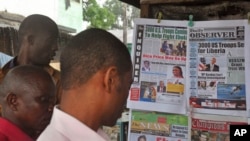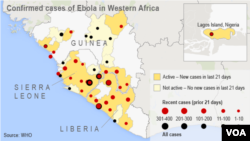A French staff member of Doctors Without Borders (MSF) has contracted the Ebola virus while working in Liberia.
The humanitarian relief organization announced in a press release Wednesday that the woman, who was on assignment in Monrovia, was placed in isolation on Tuesday after developing a fever. She will be taken to France for treatment.
MSF has more than 2,000 workers in West Africa responding to the Ebola crisis, including 200 foreign international staffers.
The woman is the most recent case of foreign health care workers who have become ill while treating Ebola patients in West Africa.
U.S. Troops to Liberia
At the request of the Liberian government, U.S. President Barack Obama said this week that 3,000 U.S. troops would deploy to West Africa to coordinate the medical and humanitarian response to Ebola.
The U.S. soldiers will be based in Monrovia and tasked with training medical workers, managing supplies and building new treatment facilities.
US Initiatives to Fight Ebola
U.S. Initiatives to Fight Ebola
- Assign 3,000 U.S. forces to Monrovia, Liberia, to provide command and control support in the region, facilitate coordination of U.S. and international relief efforts.
- Train as many as 500 health care workers a week.
- Build 17 heath care facilities in the region of 100 beds each.
- Provide home health care kits to 400,000 households, including 50,000 that the U.S. Agency for International Development will deliver to Liberia this week.
- Carry out a home- and community-based campaign to train local populations on how to handle exposed patients.
Sources: White House, AP
Obama said the U.S. military is in the best position to expedite the international response.
"We're prepared to take leadership on this to provide the kinds of capabilities that only America has, and to mobilize the world in a way that only America can do," he said.
"This is an epidemic that is not just a threat to regional security, it's a potential threat to global security if these countries break down, if their economies break down, if people panic," Obama said. "That has profound effects on all of us, even if we are not directly contracting the disease."
"Significant moment" for Liberia
Liberia's President Ellen Johnson Sirleaf on Wednesday called the decision to "significant moment" in the battle against the worst Ebola outbreak on record. She said she hoped the U.S. decision would spur other nations into action.
In a message to the Liberian people, Johnson Sirleaf said on Wednesday her government was "fighting back'' against the deadly virus. Ebola has killed around 1,300 people in Liberia, the country hardest hit by the outbreak.
"Our American partners realize Liberia cannot defeat Ebola alone. This disease is not simply a Liberian or West African problem. The entire community of nations has a stake in ending this crisis,'' Johnson Sirleaf said in a written statement.
U.N. to take the lead
Earlier this week, U.N. Secretary-General Ban Ki-moon said he and World Health Organization Director General Margaret Chan will outline an international plan to combat the Ebola virus on Thursday, during an emergency meeting of the U.N. Security Council.
The council is due to vote the same day on a U.S.-drafted resolution calling on member states to quickly send aid, field hospitals and health workers to affected countries and lift travel restrictions to those areas.
Ban said the U.N. General Assembly will also hold a "high-level meeting" on the situation next week. He called the Ebola outbreak "an exponential crisis that demands an exceptional global response."
"Every day we delay, the cost and suffering will grow exponentially. We cannot allow bans on travel or transport to slow us down," Ban said.
"We need isolation of people affected by Ebola -- not of nations struggling to cope with it."
Worst outbreak in history
The most recent outbreak has killed nearly 2,500 people - a conservative estimate that health experts say could be two to three times as high, given unreported cases.
The outbreak of the highly contagious virus, which causes fever and uncontrolled bleeding, was first confirmed in the remote forests of southeastern Guinea in March, then spread across Sierra Leone and Liberia.
A handful of Ebola deaths have been recorded in Nigeria, Africa's most populous country.
Economic funding
The International Monetary Fund said on Wednesday that it would give $127 million in interest-free loans to the three countries most affected by the virus - Guinea $40 million, Liberia $48 million and Sierra Leone $39 million.
A day earlier, the World Bank approved a $105 million grant for the Ebola response.
The United Nations estimates it will need $1 billion to combat the deadly disease in the coming six months.
(Click here for more information on Ebola )
Anne Look contributed to this report from Dakar, Senegal, Kells Hetherington reported from Washington, some material for this report provided by Reuters.






